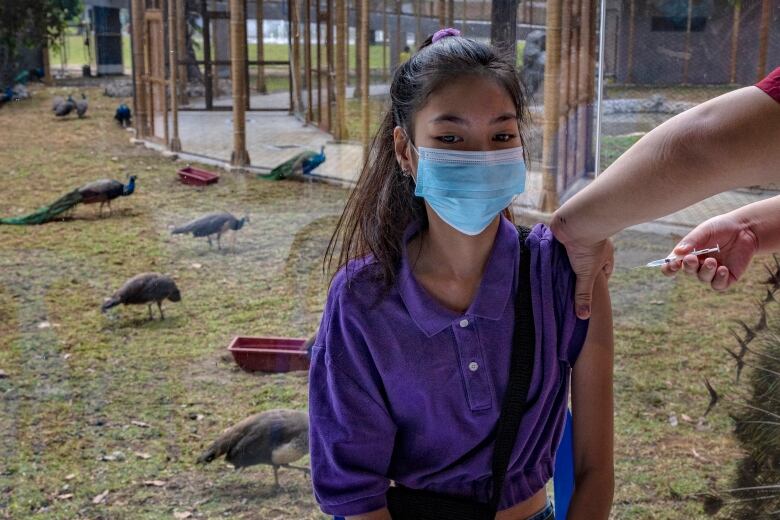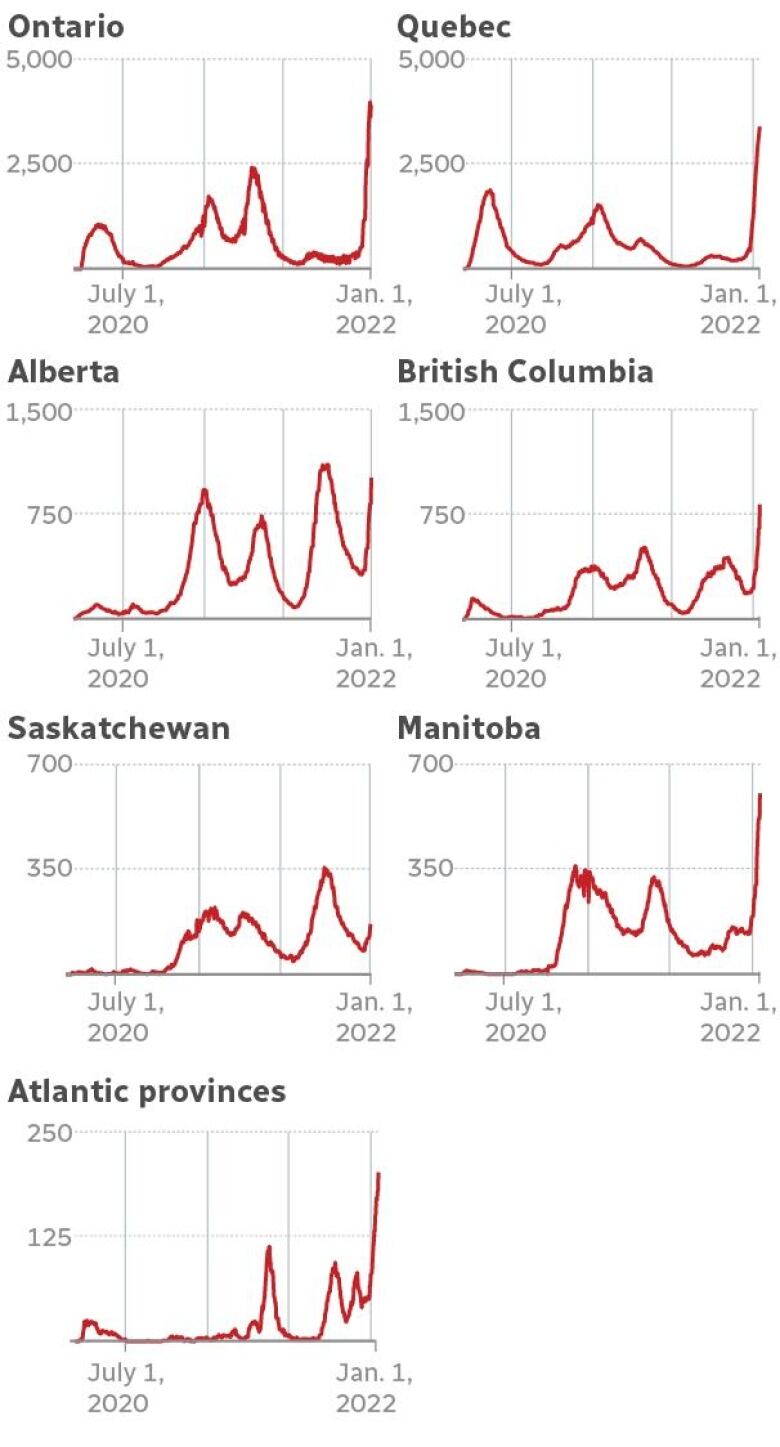

Canada’s inflation rate rises to new 30-year high of 4.8%
Statistics Canada reported Wednesday that grocery prices increased by 5.7 per cent in 2021, the biggest annual gain since 2011.
The price of fresh produce is being walloped by two things, the data agency said: “Unfavourable weather conditions in growing regions, as well as supply chain disruptions.”
Take oranges, for example. The U.S. is the major supplier to Canada, and because of bad weather and a plant disease called citrus greening, the major growing region of Florida is on track to produce the smallest number of oranges since 1945.
“If you’re an orange juice drinker, it means your prices are going to be going up at the store,” analyst Phil Flynn, with Chicago-based commodity trading firm Price Group, told CBC News. “The cost of orange juice has almost doubled here in the last few months, and that’s going to be passed down to the consumers.”
Other types of food are going up quickly, too. The price of frozen beef has gone up by almost 12 per cent in the past year, while ham and bacon are up by about 15 per cent.
Economist Tu Nguyen with consultancy RSM says food price increases could be set to get even worse in the coming weeks and months because of new rules forbidding unvaccinated truckers from entering the country.
“The current bout of inflation is driven by supply chain disruptions, pent-up demand and inflation expectations,” she said. “While pent-up demand is expected to ease as pandemic spending winds down, supply chain and inflation expectations remain paramount challenges.”
The overall inflation rate was 4.8 per cent in December, an increase of one-10th of a percentage point from November, but on an annual basis the fastest rate of increase since 1991.
Shelter costs and costs for many durable goods — in no small part due to a global shortage of semiconductor chips — are also rising faster than the overall inflation rate.
The one area of relief for consumers was gas prices, which fell by 4.1 per cent from November, the largest monthly drop since the first full month of the pandemic.
Nevertheless, federal Conservative finance critic Pierre Poilievre called on the Liberal government of Prime Minister Justin Trudeau to announce “an immediate action plan to reverse the rising cost of living that his government has worsened through its taxes, spending and red tape.”
After Wednesday’s inflation report, investors think there’s about a 75 per cent chance an interest rate hike will come as soon as next week, when the Bank of Canada is set to meet.
“Inflation is likely to come down over the next year, but getting it there will require tighter financial conditions and rate hikes by the Bank of Canada,” said James Marple, TD Bank economist.
The bank slashed its rate to a record low of 0.25 per cent at the start of the pandemic.
From The National
Famed virologist Angela Rasmussen talks to Adrienne Arsenault about the origins of Omicron, what’s next for the COVID-19 pandemic and the death threats she’s received since taking over a top lab in Saskatoon. 6:57
Canada terminates $222M PPE contract following forced labour probe
Public Services and Procurement Canada (PSPC) has terminated two supply contracts with Supermax Healthcare Canada following allegations that the nitrile gloves it supplies for use by Canadian health-care workers were made with forced labour.
The contracts for synthetic rubber medical gloves, worth more than $222 million, were part of the $8-billion push led by former procurement minister Anita Anand to equip Canadian health-care workers with the personal protective equipment they needed during the COVID-19 pandemic.
The gloves were manufactured in Malaysia, which provides an estimated two-thirds of the world’s supply of disposable medical gloves. Malaysia was one of the original signatories to the Comprehensive and Progressive Trans-Pacific Partnership (CPTPP) — which bans the use of forced labour but the Asian country has yet to ratify and implement the agreement.
“Based on the seriousness of the allegations and expected timelines for the final audit results, the Government of Canada has decided, and Supermax Healthcare Canada has agreed, to terminate by mutual consent the two existing contracts for the supply of nitrile gloves,” the department told CBC News in an email Tuesday, confirming an earlier report from Reuters that Canada’s contract with the Malaysian supplier had ended.
The federal government had first put supplies on hold with Supermax in November.
While the competitive global procurement race for personal protective equipment at the start of the COVID-19 pandemic in 2020 was described as “the Wild West,” British solicitor Nusrat Uddin told CBC News that’s no excuse for countries to turn a blind eye to labour conditions she compares to “modern slavery.”
Uddin’s firm, Wilson Solicitors, is starting legal action against the U.K. government, calling for a judicial review of the decision by its National Health Service to continue to buy gloves from Supermax, notwithstanding British pledges to crack down on forced labour.
Uddin said that Western governments should have known of reports no later than in 2014 that the medical glove industry in Malaysia was highly problematic, with workers at high risk of being abused.
“We can’t simply protect our own people by exploiting other people,” she said. “The world is becoming smaller. We’re really understanding how many of our products … are really tainted with the exploitation of others around the world.”
As of this writing, PSPC had yet to respond to follow-up questions from CBC News, including how many gloves were delivered before deliveries were put on hold.
Manitoba plans to send as many as 300 spinal-surgery patients to Fargo
The number of people in Manitoba hospitals due to COVID-19 rose by 11 on Wednesday, to a total of 631. That sets yet another high since the province started reporting that statistic daily in December 2020.
The total number of all patients in intensive care units — both those with COVID-19 and those being treated for non-COVID-related issues — is slightly more than 100. Last week, Premier Heather Stefanson said the province’s maximum ICU capacity was 116, while the pre-pandemic baseline capacity was 72.
As has happened elsewhere in Canada, the taxing effect of Omicron in terms of cases and staff shortages have exacerbated existing issues regarding wait times for a host of medical procedures.
Manitoba has reached a deal with a non-profit health-care system in the U.S. to send as many as 300 patients to North Dakota. Dr. Ed Buchel, the provincial surgery lead for Manitoba Shared Health, said the agency had identified 150 to 300 spinal-surgery patients healthy enough to make the drive to Fargo, N.D., some two-plus hours away from the Canadian border.
“These patients were waiting too long before the pandemic, and now this has just extended their wait even further,” said Buchel, adding there was no option to send patients elsewhere in Canada because every province is struggling to meet the health-care demands of the Omicron surge.
Dr. Eric Jacobsohn, a Winnipeg ICU physician who has been critical of the way the current government has managed health care, said “it makes total sense” to send long-suffering spine surgery patients to the U.S. right now. “Of course, it’s not ideal, but we’re not in an ideal time. So this is a welcome development and credit where credit is due,” Jacobsohn said.
Doctors Manitoba, which has pushed the province to address its surgery backlog, also expressed its conditional support, saying in a statement that it hopes the transfer of patients to the U.S. is a short-term fix.
Despite that, Buchel said the province may also send joint-surgery patients south and will make more announcements about backlog-reduction measures in the coming weeks.
Spinal surgeries are just one component of a provincial backlog of more than 150,000 surgeries and other medical procedures.
It is expected the first spinal patients will travel to Fargo next week or the following week. Sanford Health charges rates comparable to the cost of the procedures conducted by public health care in Canada, said Buchel, and family members are entitled to the same provincial financial supports they would receive if they travelled for medical procedures within Canada.
Data
Current COVID-19 hospitalization trends in Canada

Find out more about COVID-19
For full coverage of how your province or territory is responding to COVID-19, visit your local CBC News site.
To get this newsletter daily as an email, subscribe here.
See the answers to COVID-19 questions asked by CBC viewers and readers.
Still looking for more information on the pandemic? Reach out to us at [email protected] if you have any questions.






More Stories
Fair share: the right office solution can take finding the right partner
Ontario faces crew shortages, aircraft issues in fight against wildfires | Globalnews.ca
Refugee attends open house at Downtown Eastside affordable housing facility – BC | Globalnews.ca